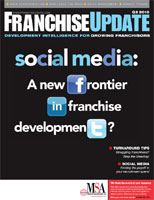Rolling with the Punches: Franchisors Continue Adapting to Change
The rules and methods for franchise sales are changing daily with the general public's increasing awareness of the economy, deficits, lending, the housing market, and more. As some of us "graybeards" can remember, this isn't the first time the rules have changed--and it won't be the last.
I remember attending meetings some years ago and asking franchisors and their sales people what they thought would help them sell more franchises. Here is a partial list of what they told me: lower interest rates; a larger employee pool; affordable real estate; higher unemployment; and in-house financing. Beware of what you ask for!
The point? Change is constant in business and franchising, as demonstrated by the following historical perspective.
In the 1970s, the FTC thought we should have a big thick book (UFOC) to tell our candidates everything about our franchise business, management team, lawsuits, franchisee successes and failures, and even financial statements on how we spent our money. It seemed like the end of the world as we knew it. Today, the current big thick book (FDD) is part of our everyday life, and has morphed into a document to assist in helping franchise candidates and franchisors conduct mutual exploration of franchise opportunities with greater ease.
With the 1980s came inflation and SBA interest rates approaching 21 percent at times. Again, someone changed the rules on us! Again, we looked at how we could overcome the restrictions and high cost of money and worked hard at creating alternative and financing avenues. Home equity started to become a common method for financing, and "family money" began to enter the discussions we had with our candidates.
In first part of the 1990s, the First Gulf War hit, creating uncertainty in the market. Because of the slowdown in the general economy, there was a slowdown in several franchise segments. Several weak franchisees needed help reselling their units, so franchisors devised programs to help them transfer their units to new owners, and again the franchise industry adjusted and moved on.
In the early 2000s, we thought we were seeing seen the fruits of all the hard work of the late '90s paying off. The economy was flying high and money was available to anyone who could fog a mirror. Concept after concept launched successfully, and the American consumer had a near-bottomless appetite for services and new retail malls. Just about any concept was working, and the international arena was looking to get in on the growth wave. We built up our overhead to support the new growth, and franchise sales were at all time highs! Then came 9/11. After small drop in activity and consumer confidence, franchising continued its growth, rising above the adversity, again adapting to change.
The "Reality Years" of 2008 to 2010 challenged our abilities as franchise leaders to figure out the changes once again. Our first concerns were to look at how to modify our support structures and develop programs to keep our existing franchisees. We then began to create programs to help new franchisees become part of our systems. We looked at how we could open for less, cut the build-out costs of the new locations, and in some cases, assist with in-house financing programs or special alliances with lenders. Overall, franchisors were responsive, and we figured out how to run lean and mean.
The future is bright
First, thank you for indulging me in this short history tour. I hope it helps you put our future opportunity in perspective, just as it did for me when writing this. We spend hours refining sales processes and changing marketing plans without taking the time to reflect on the larger fact that we are again heading into a great time for entrepreneurs.
Attitude comes from within. The ability to transfer positive vibes to your candidates can be the difference between failure and success. Talk with the people at your company, and at others, to gain insight into how they have survived similar challenges over the years, and how they came through successfully each time as a stronger and more efficient company. Share this with your prospects, and spend more time than ever "holding hands" to build the relationships with candidates that will last for years to come.
One of the laws of franchising that has remained true over the decades--and will remain true for decades to come--is that the only thing consistent in franchising is change.
Share this Feature
Recommended Reading:
FRANCHISE TOPICS
- Multi-Unit Franchising
- Get Started in Franchising
- Franchise Growth
- Franchise Operations
- Open New Units
- Franchise Leadership
- Franchise Marketing
- Technology
- Franchise Law
- Franchise Awards
- Franchise Rankings
- Franchise Trends
- Franchise Development
- Featured Franchise Stories
FEATURED IN

Franchise Update Magazine: Issue 3, 2010








 The franchise listed above are not related to or endorsed by Franchise Update or Franchise Update Media Group. We are not engaged in, supporting, or endorsing any specific franchise, business opportunity, company or individual. No statement in this site is to be construed as a recommendation. We encourage prospective franchise buyers to perform extensive due diligence when considering a franchise opportunity.
The franchise listed above are not related to or endorsed by Franchise Update or Franchise Update Media Group. We are not engaged in, supporting, or endorsing any specific franchise, business opportunity, company or individual. No statement in this site is to be construed as a recommendation. We encourage prospective franchise buyers to perform extensive due diligence when considering a franchise opportunity.